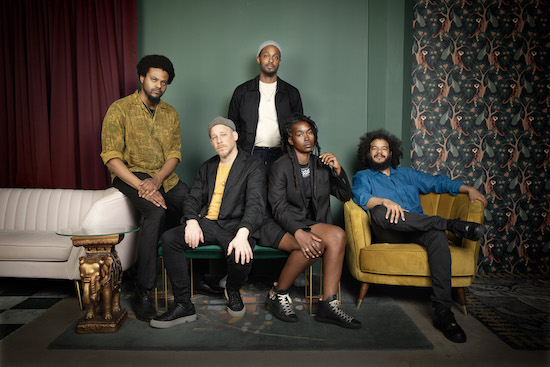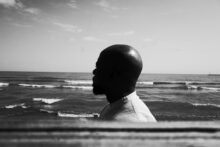Credit: Piper Ferguson
Irreversible Entanglements has managed to expand its audience and strengthen its collective vision by refusing to compromise over the course of three albums for the Chicago indie International Anthem during the quintet’s eight-year history. The ensemble’s charismatic vocalist Camae Ayewa (aka Moor Mother) has consistently pushed back against any notion that it’s her band, maintaining a fierce community vibe that reflects the band’s improvisation core. Now the group has pivoted from its scrappy DIY beginnings to release its first album on Impulse, the legendary jazz imprint that released some of the greatest work from seekers like John Coltrane, Pharoah Sanders, Archie Shepp, and Alice Coltrane, among others. The band has embraced that legacy, even recording the new album at Rudy Van Gelder Studios in Englewood, New Jersey – perhaps the most famous recording studio in jazz history. IE has taken full advantage of its new access with the biggest, most ambitious recording of its career.
Naturally, such a leap could lead to charges of selling out, and, indeed, the quintet has cast a broader net on Protect Your Light, enlisting several outside guest musicians and singers, and even serving up some tracks that eschew the often strident sense of righteousness that’s marked its previous albums. But engaging with the music makes clear that IE remains as fierce and as focused as ever. The group has continued on a path of artistic growth that affords different cadences and viewpoints to emerge. In recent years trumpeter Aquiles Navarro and saxophonist Keir Neuringer have complemented their horn work with live electronics during performances, and for the first time in the group’s history it’s taken advantage of the studio, with a variety of overdubbed instrumentation adding oomph to an already electric attack without ever threatening its sonic identity: Ayewa’s hectoring delivery locking into the heavy grooves sculpted by bassist Luke Stewart and drummer Tcheser Holmes, while the two horn players add interactive chatter, cries, and fractured melodies.
Still, the album opener ‘Free Love indicates a sonic expansion, with Ayewa’s lyrics celebrating personal connection with an almost giddy sense of discovery. The track opens like a simmering benediction, riding a see-saw riff as Ayewa chants the titular phrase, but then a pivot toward a brighter, rhythmically snappy groove and a buoyant horn pattern ushers in a surprisingly tender, even romantic recollection of intimacy: “it was the sweetest love she ever known / sweet kisses on collarbones.” The vibe gets even more ebullient and celebratory with the title track, which features the twined, gospelized cries of guest vocalists Janice Lowe and Sovie, riffing exclusively on the title phrase — leaving the rest to the imagination — while Ayewa sticks mainly to percussion and synthesizer on a brass jam that collides Haitian and New Orleans carnival traditions, a defiantly triumphant statement that transforms preservation into an act of strength. On the surface these two pieces represent a much different aura than the group’s usual free jazz fire, toggling towards outright tenderness and joy without surrendering the ensemble’s inherent bite, but as the album evolves it becomes clear that these sentiments are fully locked into its oppositional drive, as if taking stock in vulnerability as they gear up to fight.
That fury returns on ‘Our Land Back’, an anthem for the dispossessed and occupied, who lack the power and resources to return. As the band generates a roiling exposition, stoked by the piano chords of Lowe and the smeared lines of Navarro and Neuringer, Ayewa enters to ask, “Who holds our stories?” protesting the eradication of civilizations due to colonization in the US and “in Ethiopia, in Nigeria, in the so-called Middle East / who knows what happened?” But the rest of the album recedes from pure protest. ‘Soundness’ is all about carving out a space – “a room” in Ayewa’s parlance – for safe, secure contemplation. As the horns exchange fiery, interactive salvos – with greater intuition and rapport than ever – it becomes clear that IE itself provides that shelter, as she exalts:
you are welcomed here
in the room
there is joy in the room
there is love in the room
come in the room
let the sound wash over you
‘root<=>branch’ is an homage to jaimie branch, a close compadre of the group, as Ayewa channels the name of the late trumpeter’s band name Fly or Die into a mantra signifying freedom. The track opens with an insistent contrapuntal riff shaped by guest cellist Lester St. Louis, a key member of branch’s quartet, that serves as a stubborn bulwark against stasis. The horn blow a meditative line that maintains a funereal solemnity against subtly roiling electronics until the piece suddenly explodes into a blazing workout, with the entire band chanting, “We can all be free” as they back up the sentiment with their instruments, injecting ad libs within with imperturbable propulsion.
On the airy ‘Celestial Pathways’, in which the horns improvise weightless yet pointed pleas over a spacious rhythmic churn, Ayewa asserts a baptismal primacy that precedes religion: “take me down to the river / to a deeper past / before oil / before the master’s plan.” ‘Sunshine’ is probably the group’s first out-and-out ballad, with guest Lowe spreading gentle piano accents and cooing “The sun shines in our eyes,” and, later, “The sun sets in our eyes,” as the rest of the group forges a mewling acoustic warmth cut by a thickening chorus of astringent analogue synth squelches that seems to question any sense of calm or peace. But the album’s closing track ‘Degrees of Freedom’, where the group is rejoined by St. Louis, erases any doubts about the transformative power of sound. The horns swagger between free jazz mayhem and New Orleans brass jubilation and Ayewa embraces the liberatory punch of Black music. Her oratory embraces conflict and contradiction, intoning, “in a world where color is anti-black / and the rainbow is met with a cohesive interference,” she demands a platform for expression, insisting “let the horns cry out” as Navarro and Neuringer do just that over a luscious R&B-style vamp. At once it’s the group’s most hopeful and fragile release, transmitting an openness in an era where defensiveness is the default, staking out IE’s most radical position yet.





